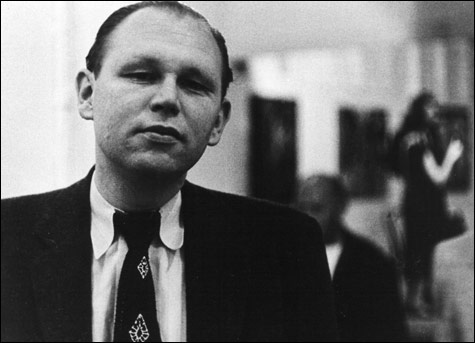
CATCHER: After reading Spicer, you may feel that much American poetry is fake, the quality of its emotions bland as baby food. |
| My Vocabulary Did This to Me: The Collected Poetry of Jack Spicer | Edited by Peter Gizzi and Kevin Killian | Wesleyan | 496 pages | $35 |
Jack Spicer died in 1965, age of 40, of acute alcoholism. His last words, spoken on his deathbed to the poet Robin Blaser, were, "My vocabulary did this to me." Spicer believed that words are magic, that they have the power to "do" good and harm to people. He also believed that his poems were dictated to him by Martians and that he, like all poets, was a radio transmitting the messages he received. A passionate baseball fan, he asserted, "Poets think they are pitchers, but they are really catchers." He had a sense of humor, but he meant to define the muse for 20th-century American poets.Peter Gizzi and Kevin Killian — poets, and the most knowledgeable and dedicated Spicereans — have brought together all the known Spicer poems in one place and given American poetry an essential book. Not that Spicer is for the common reader. God forbid. His poetry is like a glass of potent spirits; you don't always have a taste for it, but when you do, it is the only drink that will do. It's not easy to like Spicer's work. He can be cutting, nasty, self-pitying to an extreme, the smartest one in the room, and a masterful, cruel putdown artist. That these are strengths is not paradoxical. Spicer was not interested in paradox. Taking dictation from "Martians" allowed him to get away with murder, and after reading him, you may feel that much American poetry is fake, the quality of its emotions bland as baby food.
"Sweet God, poetry hates Boston," Spicer wrote. He spent much of his life in the San Francisco area, a co-founder of the Beat-nurturing Six Gallery, but during 1955–1956 he lived in the Hub, where his poet friends were the other side, the dark side, of Robert Lowell's Beacon Hill: John Wieners, Joe Dunn, Steven Jonas, and Blaser. He worked briefly at the Boston Public Library and later claimed that while there he accidentally broke the back of the library's only copy of the Bay Psalm Book. True or not, he was an anarchist and no respecter of convention or the dead hand of tradition. He watched "the corpse of Emily Dickinson floating up the Charles River," where he saw 5000 fish die:
But watch those upturned eyes
That gleam like God's own candles in the sun. Nothing
Deserves to live.
It is almost impossible to quote Spicer in any useful way. He wrote lots of stand-alone poems, but the serial poem was his preferred form, separate but linked. Someone has described reading the parts as like going from one room into another with the lights going out behind you. To quote them to advantage would leave no room for this review — an outcome he would have applauded.